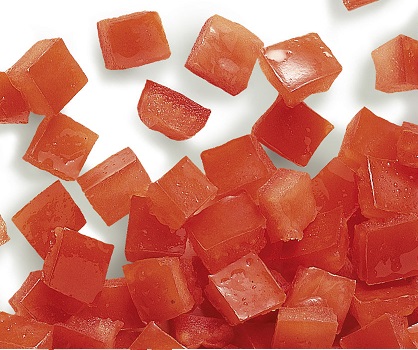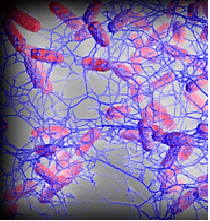In a study published in J Food Prot (2020) 83 (12): 2158–2166, researchers from Michigan State University assessed the efficacy of a novel sanitizer blend consisting of peracetic acid (PAA; OxypHresh 15) with a sulfuric acid–surfactant (SS) antimicrobial (PAA-SS; ProduceShield Plus) against Salmonella during simulated commercial washing of diced tomatoes. Overall, PAA-SS (1.75 ± 0.75 log CFU/g) was significantly (P ≤ 0.05) more effective than water (0.69 ± 0.42 log CFU/g), chlorine (0.35 ± 0.36 log CFU/g), or SS (0.36 ± 0.19 log CFU/g) in reducing Salmonella. After washing for 20 s, PAA-SS was the only sanitizer to show a significant (P ≤ 0.05) reduction (1.93 ±0.59 log CFU/g) in Salmonella. The yeast and mold populations were below the limit of detection (1.40 log CFU/g) and significantly (P ≤ 0.05) lower on diced tomatoes after 14 days of refrigerated storage Using PAA-SS as compared with the other treatments (8.37 ± 0.08 log CFU/g), with SS at pH 1.8 (3.91 ± 0.93 log CFU/g) most effective against yeast and mold in the absence of an organic load. @ https://meridian.allenpress.com/jfp/article-abstract/83/12/2158/441274/Use-of-a-Novel-Sanitizer-To-Inactivate-Salmonella?redirectedFrom=fulltext
Mary-M
A study published in J. Food Protection (Vol. 83(12) p 203202040) reports on biofilm formation by pathogens. Biofilm formation was assessed by qualitative detection of extracellular polymeric substances on Congo red agar, by adherence to glass with the tube method, by the crystal violet biofilm (CV) assay, and by the 3-(4,5-dimethylthiazol-2-yl)-2,5-diphenyl tetrazolium bromide (MTT) assay. Ten strains each of Listeria monocytogenes, Staphylococcus aureus, Escherichia coli, and Bacillus cereus were tested. The incubation conditions and time influenced the amount of biofilm formed as well as did the growth medium. In the test tubes with Luria-Bertani broth (LBB), 22.5% of the strains were adherent, and 77.5% were slightly adherent. Stronger adhesion was obtained in brain heart infusion (BHI) with 2% sucrose; 60% of the isolates were adherent. In BHI plus 2% sucrose, SBP was noted for 42.5 and 37.6% of the strains after 24 and 48 h, respectively. In the MTT assay with LBB, 15% of the strains showed high metabolic activity after 24 h of incubation, and 25% of the strains showed high activity after 48 h. In BHI plus 2% sucrose, 70 and 85% of the incubated strains were classified as high metabolic activity after 24 and 48 h, respectively. @ https://meridian.allenpress.com/jfp/article-abstract/83/12/2032/440811/Biofilm-Forming-Ability-of-Pathogenic-Bacteria?redirectedFrom=fulltext
ruth
In the UK, the FSA issues Product Withdrawal Information Notices and Product Recall Information Notices that Happy Hounds Wales Ltd is taking the precautionary step of recalling several raw dog food products because they may contain salmonella. The products include frozen beef kidney, frozen whole hearts, frozen chicken and beef sleeve, frozen lamb and beef sleeve, and frozen diced hearts. The products listed above may contain salmonella. Salmonella is a bacterium that can cause illness in humans and animals. Therefore, the product could carry a potential risk because of salmonella’s presence, either through direct handling of the pet food or indirectly. @ https://www.food.gov.uk/news-alerts/alert/fsa-prin-57-2020
ruth
A new report from Allied Market Research (“Food Safety Testing Market by Contaminant (Pathogen, Genetically Modified Organism (GMO), Chemical & Toxin, and Others), Food Tested (Meat & Meat Product, Dairy & Dairy Product, Cereal, Grain, & Pulse, Processed Food, and Others), and Technology (Agar Culturing, PCR-based Assay, Immunoassay-based, and Others) – Global Opportunity Analysis and Industry Forecast, 2018–2025.”) shows that the global food safety testing industry generated $13.14 billion in 2017 and is projected to reach $23.20 billion by 2025. The pathogens segment accounted for the highest market share in 2018, with more than 40% of the global food safety testing market and maintaining its dominant share during the forecast period. The chemicals & toxins segment is projected to have the largest increase (CAGR of 8.1% from 2018 to 2025) due to an increase in monitoring of contamination levels, enactment of control measures including remediation, and consideration of sociopolitical implications to provide safe food. The capability to offer faster and more accurate results than traditional microbiological culture methods is why PCR-based assay has the largest market share, contributing to nearly half of the global food safety testing market in 2018. It is expected to continue its lead position by 2025, with the highest CAGR of 7.7% from 2018 to 2025. North America accounted for 40% of the global food safety testing market’s revenue in 2018 and is projected to maintain its leadership status by 2025. Asia-Pacific is projected to have the highest CAGR of 9.1% during the period. @ https://www.qualityassurancemag.com/article/food-safety-testing-market-market-report/
A new report from Allied Market Research notes that the global food safety testing industry generated $13.14 billion in 2017, and is projected to reach $23.20 billion by 2025.




